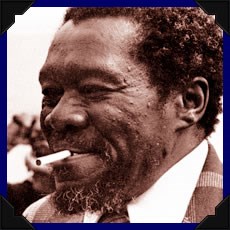
Born January 7, 1921, in rural Coahoma County, Mississippi, Joe Willie Wilkins grew up on a plantation near Bobo. His father, Frank, was a sharecropper and locally prominent guitarist whose home was often the gathering place of local and traveling musicians. The young Wilkins's first instrument was the harmonica, but soon he had learned the rudiments of guitar from his father, Richard "Hacksaw" Harney, Willie Brown, and others, as well as accordion from Walter "Pat" Rhodes and fiddle from Fiddlin' Sam Harris. Wilkins was especially earnest about the guitar and mastered all the new blues records as they were released. While still a boy, he was known as the "Walking Seeburg" (a brand of jukebox) - if you gave him a nickel he would play your request.
By the late 1930s, Wilkins was a well-known musician in the Delta, often teaming up with Sonny Boy Williamson, Robert Jr. Lockwood, and others. In 1941, Wilkins moved across the river to Helena, Arkansas, to join Williamson and Lockwood on KFFA-radio's King Biscuit Time daily broadcast. For the rest of the decade, Wilkins broadcast his innovative guitar stylings daily in the company of Williamson, Willie Love, Robert Nighthawk, Elmore James, Memphis Slim, Houston Stackhouse, Howlin' Wolf, and practically every other significant Delta blues musician of the time. According to Muddy Waters, Wilkins was the first guitarist heard in the Delta who was doing single string work without a slide, a stylistic feature central to post-war blues guitar. In later years Waters remarked, "The man is great, the man is stone great. For blues, like I say, he's the best."
By 1950, Wilkins had joined Williamson in West Memphis at radio station KWEM and began his tenure as house guitarist for Sun Records at its 706 Union Avenue studio in Memphis. He also backed many bluesmen who recorded for Trumpet Records, located at 309 Farish Street in Jackson, Mississippi. As a sideman, Wilkins recorded with most of the Delta bluesmen of the 1950s, including Williamson, Willie Love, Willie Nix, Arthur "Big Boy" Crudup, Roosevelt Sykes, "Big" Walter Horton, "Little" Walter Jacobs, Mose Vinson, Memphis Al Williams, Joe Hill Louis, Elmore James, and Floyd Jones.
Although he influenced contemporaries Houston Stackhouse, Robert Nighthawk, David "Honeyboy" Edwards, and Jimmy Rogers, Wilkins' greatest impact was on a younger generation of guitarists, including B.B. King, Albert King, and Little Milton Campbell. The essence of his style is fluidity. Notes flow from his guitar with varying intensity in stylistic similarity to the harp greats he accompanied.
In 1973, Mimosa Records released a 45rpm disk, the first recording of Wilkins's powerful, deep-Delta vocals. Subsequently, Adamo Records released an LP recording of some of his concert dates. Wilkins's home base from the late 1940s on was the house his father built at 1656 Carpenter Street in North Memphis. He was still living there when he died March 28, 1979.
Joe Willie Wilkins is buried near Memphis in Galilee Memorial Gardens.
Last updated: October 27, 2017
